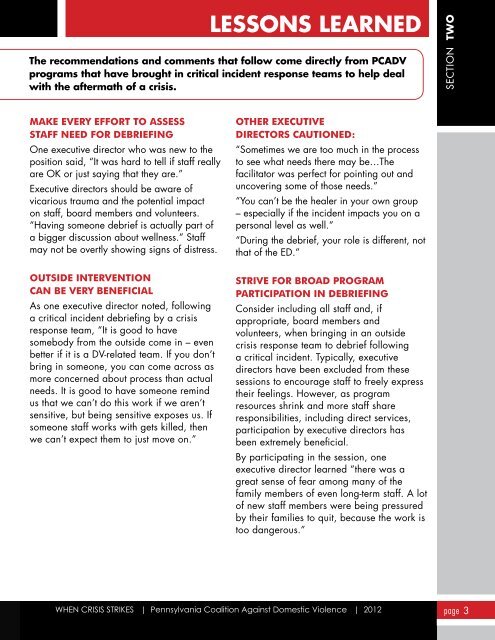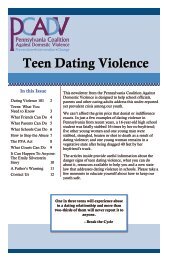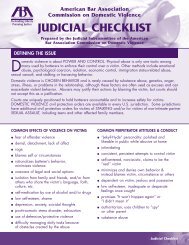Toolkit with Report Form - Pennsylvania Coalition Against Domestic ...
Toolkit with Report Form - Pennsylvania Coalition Against Domestic ...
Toolkit with Report Form - Pennsylvania Coalition Against Domestic ...
You also want an ePaper? Increase the reach of your titles
YUMPU automatically turns print PDFs into web optimized ePapers that Google loves.
LESSONS LEARNED<br />
The recommendations and comments that follow come directly from pcadv<br />
programs that have brought in critical incident response teams to help deal<br />
<strong>with</strong> the aftermath of a crisis.<br />
Section TWO<br />
Make every effort to assess<br />
staff need for debriefing<br />
One executive director who was new to the<br />
position said, “It was hard to tell if staff really<br />
are OK or just saying that they are.”<br />
Executive directors should be aware of<br />
vicarious trauma and the potential impact<br />
on staff, board members and volunteers.<br />
“Having someone debrief is actually part of<br />
a bigger discussion about wellness.” Staff<br />
may not be overtly showing signs of distress.<br />
Outside intervention<br />
can be very beneficial<br />
As one executive director noted, following<br />
a critical incident debriefing by a crisis<br />
response team, “It is good to have<br />
somebody from the outside come in – even<br />
better if it is a DV-related team. If you don’t<br />
bring in someone, you can come across as<br />
more concerned about process than actual<br />
needs. It is good to have someone remind<br />
us that we can’t do this work if we aren’t<br />
sensitive, but being sensitive exposes us. If<br />
someone staff works <strong>with</strong> gets killed, then<br />
we can’t expect them to just move on.”<br />
Other executive<br />
directors cautioned:<br />
“Sometimes we are too much in the process<br />
to see what needs there may be…The<br />
facilitator was perfect for pointing out and<br />
uncovering some of those needs.”<br />
“You can’t be the healer in your own group<br />
– especially if the incident impacts you on a<br />
personal level as well.”<br />
“During the debrief, your role is different, not<br />
that of the ED.”<br />
Strive for broad program<br />
participation in debriefing<br />
Consider including all staff and, if<br />
appropriate, board members and<br />
volunteers, when bringing in an outside<br />
crisis response team to debrief following<br />
a critical incident. Typically, executive<br />
directors have been excluded from these<br />
sessions to encourage staff to freely express<br />
their feelings. However, as program<br />
resources shrink and more staff share<br />
responsibilities, including direct services,<br />
participation by executive directors has<br />
been extremely beneficial.<br />
By participating in the session, one<br />
executive director learned “there was a<br />
great sense of fear among many of the<br />
family members of even long-term staff. A lot<br />
of new staff members were being pressured<br />
by their families to quit, because the work is<br />
too dangerous.”<br />
When Crisis Strikes | <strong>Pennsylvania</strong> <strong>Coalition</strong> <strong>Against</strong> <strong>Domestic</strong> Violence | 2012<br />
page 3








